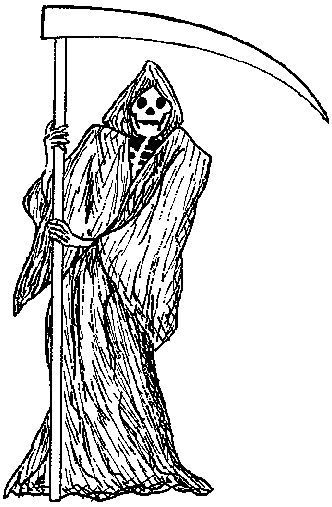「#2496. metaphor と metonymy」 ([2016-02-26-1]),「#2632. metaphor と metonymy (2)」 ([2016-07-11-1]) で2つの過程の異同について考えた.「#2196. マグリットの絵画における metaphor と metonymy の同居」 ([2015-05-02-1]) では両手段が効果的に用いられている芸術作品を解釈したが,今回は同じく両手段が同居しているイメージの例として西洋の「死神」 (Grim Reaper) を挙げよう.いわずとしれた,マントを羽織り,大鎌を手にした骸骨のイメージである.

Lakoff and Johnson (251) は,「死神」を,メタファーとメトニミーが複雑に埋め込まれた合成物 (composition) の例として挙げている.
In the classic figure of the Grim Reaper, there is such a composition. The term "reaper" is based on the metaphor of People as Plants: just as a reaper cuts down wheat with a scythe before it has gone through its life cycle, so the Grim Reaper comes with his scythe indicating a premature death. The metaphor of Death as Departure is also part of the myth of the Grim Reaper. In the myth, the Reaper comes to the door and the deceased departs with him.
The figure of the Reaper is also based on two conceptual metonymies. The Reaper takes the form of a skeleton---the form of the body after it has decayed, a form which metonymically symbolizes death. The Reaper also wears a cowl, the clothing of monks who presided over funerals at the time the figure of the Reaper became popular. Further, in the myth the Reaper is in control, presiding over the departure of the deceased from this life. Thus, the myth of the Grim Reaper is the result of two metaphors and two metonymies having been put together with precision.
複数の概念メタファーと概念メトニミーが精密に合致して,1つの複雑な要素からなる合成物としての「死神」が成立しているという.ことば以前の認識というレベルにおいて,あの典型的なイメージの根底には,精巧に絡み合ったレトリックが存在していたのである.
・ Lakoff, George, and Mark Johnson. Metaphors We Live By. Chicago and London: U of Chicago P, 1980.